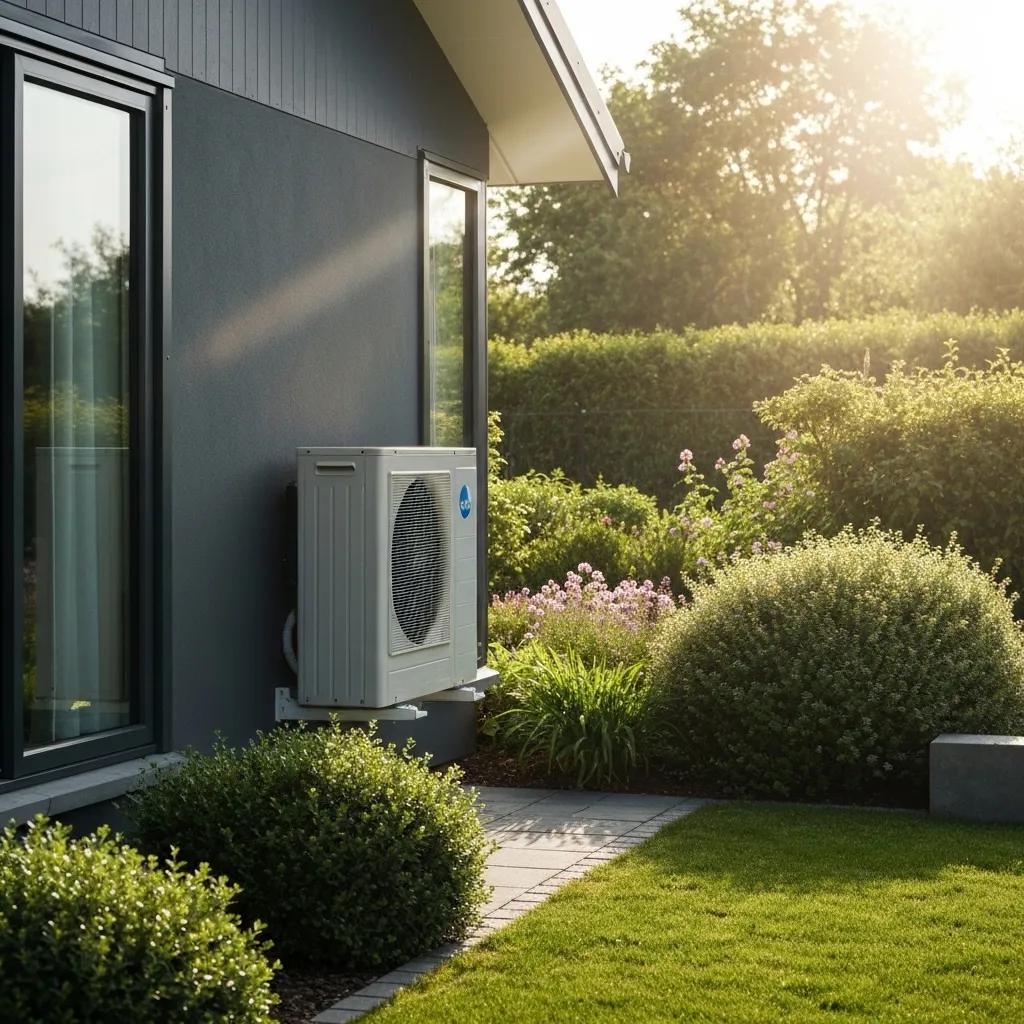Heat Pump Running Costs and Efficiency in the UK
Your Complete Guide to Smarter Performance and Bigger Savings
Understanding the real costs and efficiency of heat pumps is crucial for homeowners and landlords across Hampshire, Surrey, Berkshire, and Greater London who are looking for dependable and economical heating solutions. This guide will walk you through how running costs are figured out, what COP and SCOP really mean for performance, how air and ground source systems stack up, the UK government grants you can tap into, ways to boost your system’s efficiency, essential maintenance tips, how to tackle common issues, and what to expect cost-wise in your local area. Plus, you’ll see how Neater Heat’s top-notch installations, thorough servicing, and cost of running a heat pump plans are designed to cut your expenses and maximise your system’s output.
What Are Heat Pump Running Costs and How Are They Calculated?
Your heat pump’s running costs are essentially the total electricity bill for keeping your home warm and comfortable. This is worked out by multiplying the electricity your system uses (in kWh) by your local electricity rates, then fine-tuning for how efficiently the system converts that power into heat. Getting a clear picture of these costs helps you budget for your annual heating needs and pinpoint opportunities to save money by improving efficiency.
What Factors Influence Heat Pump Running Costs in the UK?
- The price you pay for electricity, including any differences between peak and off-peak rates.
- Your system’s Seasonal Coefficient of Performance (SCOP) and instantaneous COP, which tell you how much heat you get for every unit of electricity used.
- The size of your home and how well it’s insulated, as these dictate how much heat you actually need.
- How much the outdoor temperature fluctuates and your local climate, which affect how long your system needs to run.
- Your own habits – how you use your thermostat, your heating schedules, and general household routines.
Each of these elements plays a part, and understanding them helps you see exactly where you can make adjustments to bring your bills down.
How Do Electricity Prices and Tariffs Affect Running Costs?
Electricity prices are the biggest slice of your running costs. Standard rates typically hover around 28p–34p per kWh, but off-peak tariffs can drop significantly to 10p–15p per kWh. By opting for a time-of-use or Economy 7 plan and scheduling your heating to run during these cheaper periods, you could slash your expenses by up to 40%, making a noticeable difference to your daily and yearly bills.
How Does Property Size and Insulation Impact Heat Pump Costs?
Naturally, larger homes require more heating. However, excellent insulation and effective draught-proofing can cut down heat loss by a substantial 30–50%. By improving your loft, wall, and floor insulation, you reduce the workload on your heat pump, which directly translates into lower electricity bills and a more consistently comfortable home temperature.
How Does Climate and Outdoor Temperature Influence Running Costs?
Heat pumps perform best in milder weather. For every 1°C drop below the system’s optimal operating temperature, you might see an increase in runtime of 3–5%. During particularly cold spells, the system’s defrost cycles will kick in more often, leading to a slight uptick in electricity usage until the temperatures rise again.
How Can User Habits and Thermostat Settings Change Running Costs?
Being smart with your thermostat can lead to significant savings. Setting it back by just 1–2°C overnight or when you’re out can reduce energy use by 8–12%. Smart controls that learn your household’s patterns and automatically adjust flow temperatures ensure you’re only using the energy you need, without sacrificing comfort. Fine-tuning your heating schedule based on your lifestyle is a powerful way to drive efficiency and savings.
How Efficient Are Heat Pumps? Understanding COP and SCOP in the UK Context

The Coefficient of Performance (COP) and Seasonal Coefficient of Performance (SCOP) are your key metrics for understanding how effectively a heat pump converts electricity into heat. These figures are vital for comparing different models and getting a realistic idea of their performance and running costs.
What Is the Coefficient of Performance (COP) and Why Does It Matter?
COP is a snapshot measurement: it’s the ratio of heat energy your system delivers compared to the electrical energy it consumes under specific, controlled test conditions. A COP of 4, for instance, means your heat pump produces 4 units of heat for every 1 unit of electricity used. This tells you about its immediate efficiency and gives you a good indication of expected running costs when the weather is relatively mild. The coefficient of performance relates closely to this explanation.
How Does Seasonal Coefficient of Performance (SCOP) Reflect Real-World Efficiency?
SCOP takes things a step further by averaging the COP over an entire heating season. This is crucial because it accounts for the fluctuating outdoor temperatures we experience throughout the year in the UK. A system with a SCOP of 3.5 will deliver, on average, 3.5 kWh of heat for every kWh of electricity used throughout the winter, offering a much more accurate prediction of your annual performance and energy bills.
Heat Pump Performance and Efficiency – UK Context
Research highlights the Seasonal Coefficient of Performance (SCOP) as a critical measure for assessing heat pump efficiency, particularly given the UK’s unpredictable climate. SCOP provides a more reliable annual performance estimate than the Coefficient of Performance (COP), which is based on specific test conditions. A higher SCOP value directly correlates with greater energy efficiency and lower heating expenses over the course of the heating season.
Energy Saving Trust, Heat pumps: what you need to know (2024)
What Are Good COP and SCOP Values for UK Heat Pumps?
For high-quality air source heat pumps, you can typically expect coefficient of performance values of 3 to 4 when the outside temperature is around 7°C. The best models achieve SCOPs ranging from 3.5 to 4. Ground source systems often perform even better, frequently exceeding a SCOP of 4, thanks to the consistently stable temperatures found underground. These are excellent choices for properties with ample garden space and a larger budget for installation.
What Factors Affect COP and SCOP Performance?
Several key elements influence how well your heat pump performs:
- The flow temperature you set – lower temperatures (around 30–35°C) generally result in higher COP.
- The temperature of the heat source, whether it’s the outside air or the ground.
- The design of the compressor, the type of refrigerant used, and how efficiently the defrost cycle operates.
- The correct sizing of the system and how well the hydraulics are balanced within your home’s heating distribution network.
Getting these technical aspects right is fundamental to achieving long-term efficiency and significant cost savings.
How Do Air Source and Ground Source Heat Pumps Compare in Running Costs?
What Are the Key Differences Between Air Source and Ground Source Heat Pumps?
Air source heat pumps work by extracting heat from the ambient air. They’re generally quicker to install and come with a lower initial price tag. Ground source systems, on the other hand, use buried pipe loops to tap into the stable temperatures beneath the earth’s surface. This typically leads to higher coefficient of performance ratings, quieter operation, and less visual impact, but involves more complex installation and a greater upfront investment.
How Do Running Costs Differ Between Air Source and Ground Source Heat Pumps?
Ground source systems often boast annual running costs that are 10–20% lower. This is because their consistent heat source allows them to maintain SCOP ratings above 4. Air source units typically operate with SCOPs between 3 and 3.8, meaning slightly higher electricity consumption, but this is often balanced out by their simpler installation and lower groundwork costs.
Which Heat Pump Type Is Best for Different UK Property Types?
- Detached houses with gardens and sufficient outdoor space are ideal candidates for ground source systems, offering the highest efficiency potential.
- Semi-detached homes or properties in urban areas often find air source systems more practical due to their minimal space requirements.
- Flats or apartments might be suited to smaller air source units, potentially integrated with communal ground loops or hybrid heating setups.
What UK Government Grants and Financial Support Are Available for Heat Pumps?
What Is the Boiler Upgrade Scheme and Who Is Eligible?
The Boiler Upgrade Scheme offers a grant of £7,500 towards the cost of installing either an air source or a ground source heat pump in England and Wales. If you’re a homeowner or a private landlord looking to replace a fossil fuel boiler in a property that’s not connected to the gas grid, or a new build, you could be eligible. You’ll need an Energy Performance Certificate (EPC) rating of D or above and a recommendation from an MCS-certified installer.
Government Incentives for Heat Pumps – UK
The Boiler Upgrade Scheme is a key UK government initiative designed to provide financial assistance to homeowners and landlords for heat pump installations. This scheme helps to lower the initial cost of switching from traditional fossil fuel heating systems to cleaner, low-carbon alternatives. To qualify, you typically need to be replacing an existing fossil fuel boiler and meet certain energy efficiency standards for your property. For more information, visit boiler upgrade scheme increased to 7500.
Department for Energy Security and Net Zero, Boiler Upgrade Scheme(2024)
How Can Neater Heat Assist with Heat Pump Grant Applications?
Neater Heat is here to guide you through every stage of the grant application process. We’ll help you confirm your eligibility, manage the necessary paperwork, coordinate with our MCS-certified installation team, and submit your claim, ensuring you receive the maximum funding available with the least amount of fuss.
Are There Other Regional or Local Grants for Heat Pumps in Hampshire, Surrey, Berkshire, and Greater London?
In addition to the national scheme, some local councils and Combined Authorities offer supplementary grants or interest-free loan options. Neater Heat stays up-to-date with these local incentives, helping our clients take advantage of every available scheme to further reduce their initial investment and ongoing running costs by utilizing renewable energy.
How Can You Optimise Your Heat Pump to Reduce Running Costs?
What Are the Best Thermostat Settings and Smart Controls for Efficiency?
- Consider setting your thermostat back by at least 2°C overnight.
- If you have underfloor heating, aim to keep flow temperatures capped around 35°C.
- Utilise smart learning modes that intelligently pre-heat your home only when needed.
By using smart thermostats equipped with adaptive algorithms and multi-zone temperature sensors, you can potentially boost your system’s yearly performance by up to 15%.
How Does Property Insulation and Draught-Proofing Improve Heat Pump Performance?
Upgrading your wall, roof, and floor insulation significantly reduces heat loss, which can cut your system’s runtime by 20–40%. Sealing up gaps around windows and doors prevents cold air from creeping in, allowing your heat pump to operate at its most efficient flow temperatures for longer periods and lowering your electricity consumption.
How Can Off-Peak Electricity Tariffs Lower Running Costs?
Switching to an electricity tariff that offers cheaper rates during off-peak hours, such as Economy 7, allows you to schedule energy-intensive tasks like boosting hot water or running defrost cycles for when electricity is at its cheapest. This can lead to annual savings of up to £200 for homeowners.
Why Is Proper System Sizing and Design Important for Cost Savings?
An undersized heat pump will struggle to meet your home’s heating demands, leading to reduced efficiency (lower COP). Conversely, an oversized unit will frequently switch on and off (short-cycling), wasting energy. A system expertly designed by Neater Heat ensures perfect hydraulic balance, optimal flow temperatures, and equipment that’s precisely matched to your property’s specific heat loss profile.
How Does Pairing Heat Pumps with Underfloor Heating or Radiators Affect Efficiency?
Underfloor heating systems operate at much lower flow temperatures (typically 30–35°C) compared to traditional radiators (which often require 50–60°C). This difference can lead to up to 40% greater efficiency when used with a heat pump. If underfloor heating isn’t an option, high-output radiators designed for low-temperature operation can also offer improved performance.
What Maintenance Is Required to Keep Heat Pumps Running Efficiently and Cost-Effectively?

What DIY Maintenance Can Homeowners Perform to Improve Efficiency?
- Clean the collector on the rear of the ASHP every 1–3 months to ensure unrestricted airflow.
- Keep the area around your outdoor unit clear of debris to prevent airflow blockages.
- Check condensate drains for any blockages to avoid potential water leaks.
Regular, simple checks like these help maintain your system’s rated COP and SCOP performance between professional service visits.
Why Is Professional Servicing Important and How Often Should It Be Done?
Annual professional inspections are vital. Our technicians will check for refrigerant leaks, test electrical connections, calibrate controls, and verify the defrost cycle is working correctly. This expert attention helps preserve up to 95% of your system’s original performance and prevents gradual efficiency degradation over time.
How Do Neater Heat’s Boiler Care Plans Support Heat Pump Longevity and Running Costs?
Neater Heat offers a range of tiered boiler care plans that include scheduled heat pump servicing, priority response for call-outs, and discounted repair rates. Customers on one of our plans typically experience fewer breakdowns, consistently high efficiency, and more predictable budgeting for maintenance expenses. For a deeper dive into what’s covered, please visit our boiler care plans page.
What Are Common Heat Pump Running Problems and How Can They Be Troubleshooted?
What Are Typical Issues Affecting Heat Pump Running Efficiency?
- Frost or ice building up on the outdoor coils, leading to more frequent defrost cycles.
- Low refrigerant levels due to undercharging or leaks, which reduces heat output.
- Blocked filters or internal coils impeding airflow.
- Malfunctioning thermostats that incorrectly communicate heating requirements.
How Can You Identify and Fix Simple Heat Pump Running Issues?
- Check and clean your filters monthly.
- Make sure the outdoor unit has clear, unobstructed airflow around it.
- If your thermostat seems to be giving incorrect readings, try resetting it to its factory default settings.
- Keep an eye on the defrost cycles – if they’re happening too often or for too long, it could signal a refrigerant or sensor issue.
When Should You Contact Neater Heat for Professional Repair Services?
If you’ve tried the basic troubleshooting steps and the problem persists, or if you notice a sudden drop in your system’s COP/SCOP, hear unusual noises, or see persistent error codes, it’s time to schedule a professional diagnostic with Neater Heat. We’ll get your system back to peak performance and prevent minor issues from becoming costly problems.
What Are the Average Heat Pump Running Costs in the UK and Locally?
What Is the National Average Cost to Run a Heat Pump Per Day and Year?
Across the UK, you can expect the average daily cost to run a heat pump to be between £3.20 and £4.00. This is based on a coefficient of performance of 3.5 and an electricity price of 28p/kWh, bringing the annual total to approximately £1,170–£1,460. These figures serve as a useful benchmark for comparing local costs and alternative heating systems.
How Do Running Costs Vary in Hampshire, Surrey, Berkshire, and Greater London?
| Region | Daily Cost (GBP) | Annual Cost (GBP) |
|---|---|---|
| Hampshire | 3.10–3.80 | 1,130–1,380 |
| Surrey | 3.20–3.90 | 1,150–1,420 |
| Berkshire | 3.05–3.75 | 1,115–1,365 |
| Greater London | 3.30–4.00 | 1,185–1,460 |
How Do Heat Pump Running Costs Compare to Gas, Oil, and LPG Boilers?
| System Type | Annual Running Cost | Efficiency Range |
|---|---|---|
| Air Source Heat Pump | 1,150–1,420 GBP | SCOP 3.5–4.0 |
| Ground Source Heat Pump | 1,000–1,250 GBP | SCOP 4.0–5.0 |
| Modern Gas Boiler | 950–1,200 GBP | 85–95% |
| Oil Boiler | 1,300–1,600 GBP | 85–92% |
| LPG Boiler | 1,400–1,700 GBP | 85–95% |
What Savings Can You Expect Over Time with Heat Pumps?
By combining government grants, smart off-peak electricity tariffs, and efficiency improvements, homeowners can look forward to:
- Annual heating bills reduced by up to 40% compared to using LPG or oil.
- A return on your initial investment typically within 6–10 years.
- Significant reductions in your carbon footprint, boosting your property’s value and future-proofing it against volatile fuel costs.
Frequently Asked Questions About Heat Pump Running Costs and Efficiency
How Much Does It Cost to Run a Heat Pump Per Day in the UK?
On average, running a heat pump with a SCOP of 3.5 and electricity at 28p/kWh works out to about £3.50 per day, or around £1,300 annually. This can vary based on your home’s insulation, the system’s overall efficiency, and the electricity tariff you choose.
Are Heat Pumps Cheaper to Run Than Gas Boilers in the UK?
Yes, generally they are. Even though electricity prices are higher than gas, heat pumps are incredibly efficient, delivering 3 to 4 units of heat for every unit of electricity consumed (COP 3–4). When combined with smart tariffs and good insulation, this often results in running costs that are similar to, or even lower than, gas boilers.
What Is a Good SCOP for a Heat Pump?
For the UK’s climate, a SCOP above 3.5 is considered strong. Values between 3.8 and 4.5 indicate a highly efficient system that minimises electricity usage, even when dealing with the variable temperatures of winter.
What Grants Are Available for Heat Pumps in the UK?
The main government support is the £7,500 Boiler Upgrade Scheme grant, available for eligible air and ground source heat pump installations. You may also find additional top-up grants offered by some local authorities in specific regions.
How Can I Make My Heat Pump More Efficient?
Key steps to boost efficiency include installing a smart thermostat, improving your home’s loft and wall insulation, switching to an off-peak electricity tariff, and ensuring you schedule annual professional servicing to keep your heating system performing at its best.
Achieving efficient operation, coupled with Neater Heat’s expertise in system design, installation, and ongoing care plans, unlocks the door to maximum savings and sustainable comfort, no matter your location across the UK’s diverse climate zones and heating system.




